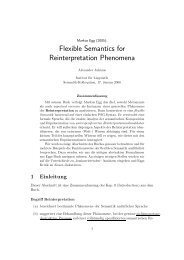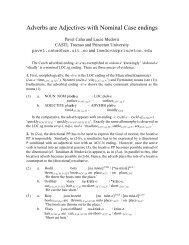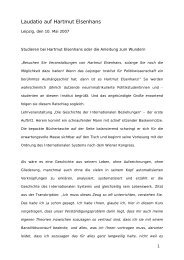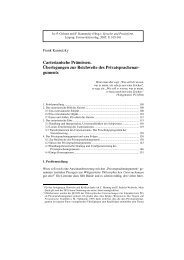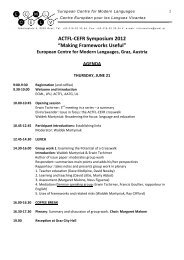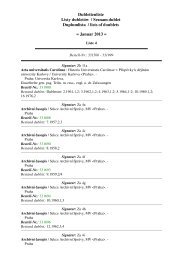2011 ACTFL CEFR Conference Report
2011 ACTFL CEFR Conference Report
2011 ACTFL CEFR Conference Report
Create successful ePaper yourself
Turn your PDF publications into a flip-book with our unique Google optimized e-Paper software.
for the group’s skill (reading, speaking, listening, or writing) as mentioned in the topic 1 papers<br />
presented and to determine if these elements are adequately referenced in the <strong>ACTFL</strong> Guidelines<br />
and the <strong>CEFR</strong> documents. Participants were asked to note whether the reference to the essential<br />
element was adequate, incomplete, needed elaboration, or was missing. Group members were<br />
asked to suggest revisions when appropriate. Following this breakout session, a representative<br />
from each group presented the group’s findings in a general session, which was followed by a<br />
discussion period.<br />
The second breakout session was a benchmarking activity during which participants were<br />
divided into the same skill-specific groups in which they had worked during the first breakout<br />
session. For this activity, participants were asked to rate a variety of samples taken from both<br />
<strong>ACTFL</strong> and <strong>CEFR</strong> assessments and to assign an <strong>ACTFL</strong> and a <strong>CEFR</strong> rating based on the<br />
reference documents provided. Ratings for each of the skill groups were collected and are<br />
currently being analyzed for correspondences.<br />
Plenary Discussion: Prioritizing Initiatives<br />
An open discussion on the second day of the conference generated many ideas and suggestions<br />
for future <strong>ACTFL</strong> <strong>CEFR</strong> collaborative initiatives. The participants were then asked to indicate<br />
their top 3-4 priorities. By an overwhelming vote, the desire to continue to explore the <strong>ACTFL</strong><br />
<strong>CEFR</strong> crosswalk was selected as the top priority, reaffirming this need not only for assessment<br />
purposes but also for teaching, learning and policy reasons. Other priorities indicated were: to<br />
develop a glossary of terms that are used in both scales, to secure funding to conduct long term<br />
joint studies to investigate realistic student outcomes from different program models<br />
(US/Europe/Canada), and to explore formative assessment initiatives that focus on<br />
commonalities for all language learners. Additional cooperation initiatives mentioned included<br />
the following: the intersections of the <strong>ACTFL</strong> K-12 Performance Guidelines and the <strong>CEFR</strong>, the<br />
sharing of models of best practices, the testing of receptive skills, the extent to which the two<br />
frameworks can be used to provide diagnostic information about language learners, and a study<br />
of “can-do” statements.<br />
Discussions were initiated regarding concrete steps forward that might be accomplished prior to<br />
a next meeting. Specific initiatives included side-by-studies of Instituto Cervantes and <strong>ACTFL</strong><br />
Writing and Speaking tests, and Goethe-Institut and <strong>ACTFL</strong> assessments.



